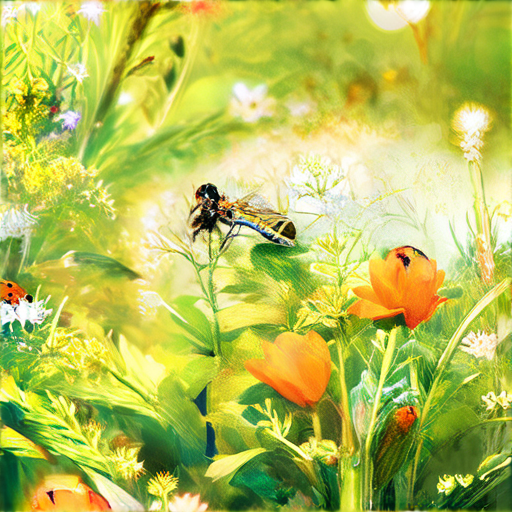Natural pest control methods offer a sustainable approach to managing unwanted pests in our homes, farms, and gardens. By harnessing the power of nature, we can reduce our reliance on chemical pesticides and maintain a healthier environment for both humans and wildlife. From essential oils to diatomaceous earth, there are numerous natural pest control methods available that can be effective and environmentally friendly.
For farmers, natural pest control methods can be particularly valuable in reducing crop damage and increasing yields. By implementing integrated pest management strategies, farmers can minimize the use of chemical pesticides and promote biodiversity in their fields. Meanwhile, homeowners can use natural pest control methods to keep pests out of their homes and gardens, creating a safer and more enjoyable living space.
In this article, we’ll explore the world of natural pest control methods, discussing everything from the benefits of using natural pest control to the most effective methods for controlling common household pests. We’ll also examine the latest research on natural pest control and provide tips for getting started with these eco-friendly approaches.
Whether you’re a farmer, homeowner, or simply looking for ways to live a more sustainable lifestyle, natural pest control methods are definitely worth considering. So let’s dive in and discover the many benefits and possibilities of using natural pest control methods to manage unwanted pests.
Natural Methods of Pest Control
When it comes to managing pests without resorting to chemical-based pesticides, there are numerous effective natural methods available.
- Old Seed offers a variety of natural pest control methods that can be implemented in various settings, including homes and gardens.
- Some of the most popular and reliable approaches include:
- Peppermint oil: Repels ants, aphids, and spider mites
- Lemon oil: Repels mosquitoes and flies
- Tea tree oil: Repels ants, cockroaches, and silverfish
- Old Seed recommends using herbs and vegetables to repel pests, and here are some examples:
- Basil: Known for its strong scent, basil repels aphids, whiteflies, and mosquitoes. Planting basil near tomato plants can help prevent these pests from infesting them.
- Mint: Mint’s pungent aroma deters ants, spiders, and aphids. However, be cautious when planting mint, as it can spread quickly and take over other plants.
- Chives: Chives repel aphids and other pests due to their onion-like scent. They can be planted around roses and other flowers to keep pests away.
- Garlic: Garlic has natural insecticidal properties that repel aphids, spider mites, and other pests. Crush garlic cloves and mix with water to create a spray that can be applied to plants.
- Cayenne Pepper: Cayenne pepper’s capsaicin content deters ants, snails, and slugs. Mix cayenne pepper with water and spray it on plants to keep pests away.
- Radishes: Radishes repel cucumber beetles and other pests due to their spicy roots. Plant radish seeds near cucumbers to keep these pests away.
- Marigold: Marigold’s bright orange and yellow flowers repel nematodes, whiteflies, and other pests. Plant marigolds around tomatoes and other plants to keep pests away.
- Nasturtium: Nasturtium’s colorful flowers repel aphids, whiteflies, and other pests. Plant nasturtiums around cabbage and other brassicas to keep pests away.
- Companion Planting: Planting certain plants together can help repel pests. For example, planting basil with tomatoes can help prevent whiteflies and aphids.
- Neem Oil: Neem oil is derived from the seeds of the neem tree and has natural insecticidal properties that repel pests. Mix neem oil with water and spray it on plants to keep pests away.
- Diatomaceous Earth: Diatomaceous earth is a powder made from fossilized algae that dehydrates and kills pests. Sprinkle diatomaceous earth around plants to keep pests away.
- Reduced exposure to toxic chemicals
- Increased crop yields and quality
- Improved soil health
- Support for biodiversity
- Lavender: Known for its calming effects on humans, lavender can also repel moths, flies, and mosquitoes when used in sachets or sprays.
- Rosemary: This herb is said to repel ants, aphids, and other garden pests when planted around plants or used in potpourri blends.
- Thyme: Thyme has natural oils that repel ants, fleas, and ticks when used in sachets or sprays.
- Ants: A study published in the Journal of Economic Entomology found that ants were less likely to cross a barrier treated with a mixture of baking soda and water.
- Cockroaches: Another study published in the Journal of Pest Science discovered that cockroaches avoided areas with high concentrations of acetic acid, which is present in vinegar.
- Flies: Some researchers believe that the carbon dioxide produced during the baking soda-vinegar reaction may help deter flies.
- Bed bugs: These flat, parasitic insects are notoriously difficult to repel using traditional methods, including baking soda and vinegar.
- Mosquitoes: While some studies suggest that citronella oil, which is often paired with baking soda and vinegar, may repel mosquitoes, there is limited evidence to support its effectiveness against these biting insects.
- Always dilute the baking soda and vinegar mixture according to the recommended ratio (typically 1 part each).
- Wear protective gloves and eyewear when handling the mixture.
- Test the mixture on a small area before applying it to larger surfaces.
- Be aware that repeated exposure to the mixture may cause skin irritation or allergic reactions in some individuals.
- Neem Oil: Derived from the seeds of the neem tree, neem oil is a natural insecticide that can be used to control a wide range of pests, including aphids, whiteflies, and spider mites. Neem oil works by disrupting the insect’s hormone system, preventing them from reproducing and eventually killing them off.
- Diatomaceous Earth: A powder made from fossilized algae, diatomaceous earth is a non-toxic and organic substance that can be used to repel and kill insects. When applied to plants, diatomaceous earth dehydrates the insects, causing them to die.
- Soap Solution: A mixture of mild dish soap and water, this solution can be used to control soft-bodied pests like aphids and mealybugs. The soap breaks down the insect’s exoskeleton, ultimately leading to their death.
- Horticultural Oil: Similar to neem oil, horticultural oil is a refined mineral oil that can be used to control a variety of pests. Horticultural oil works by suffocating the insects, preventing them from breathing and eventually killing them off.
- Predatory Insects: Encouraging predatory insects like ladybugs and lacewings into your garden can be an effective way to control pest populations naturally. These beneficial insects feed on pests, reducing the need for pesticides altogether.
- Companion Planting: Certain plants, such as marigolds and basil, have natural properties that repel pests. By incorporating these plants into your garden, you can reduce the need for pesticides and create a healthier environment for your plants.
- Physical Barriers: Using physical barriers like fine mesh or row covers can prevent pests from reaching your plants. This method is particularly effective against flying insects like whiteflies and aphids.
- Biological Controls: Introducing beneficial microorganisms like Trichoderma harzianum into your soil can help control fungal diseases and pests. These microorganisms work by breaking down the fungal cell walls, ultimately killing the disease-causing organisms.
- Cayenne Pepper: Cayenne pepper contains capsaicin, a compound that repels pests like ants and snails. Sprinkling cayenne pepper around the base of your plants can deter these pests without using chemicals.
- Crop Rotation: Changing the location of your crops seasonally can help break the life cycle of pests and reduce the need for pesticides. Crop rotation also improves soil health and fertility, promoting overall plant growth.
Essential Oils
Certain essential oils have been shown to repel or kill pests, making them a great addition to any natural pest control strategy. Some of the most effective oils include:
Fly Traps
Homemade fly traps made from vinegar, sugar, and water can be an effective way to capture and eliminate fruit flies and other flying pests.
Diatomaceous Earth
A food-grade powder made from fossilized algae, diatomaceous earth works by dehydrating pests, causing them to die. It’s particularly effective against ants, bed bugs, and cockroaches.
Traps Made from Sticky Substances
Traps coated with sticky substances like honey, corn syrup, or tree resin can capture and trap pests like ants, spiders, and insects.
Plant-Based Repellents
Certain plants, such as basil, mint, and citronella, have natural oils that repel pests. Planting these species around the perimeter of your home or garden can help keep pests away.
Seal Entry Points
Pests often enter homes through cracks and crevices. Sealing these entry points using caulk or steel wool can prevent infestations.
Companion Planting
Some plants, such as marigolds and nasturtiums, release chemicals that repel pests. Companion planting these species alongside other crops can help deter pests naturally.
Beneficial Insects
Encouraging beneficial insects, such as ladybugs and lacewings, can help control pest populations. These insects feed on pests, reducing the need for pesticides.
Soap Solution
A mild dish soap solution can be used to repel and kill pests like aphids and whiteflies.
Biological Controls
Introducing natural predators, such as parasitic wasps or nematodes, can help control pest populations.
Natural Pest Control
Effective natural pest control methods can be employed to deter pests without resorting to chemical pesticides. Here are some popular herbs and vegetables known for their pest-repelling properties:
Natural Pest Control Methods
In addition to using these herbs and vegetables, there are several other natural pest control methods that can be employed:
Benefits of Natural Pest Control
By incorporating these natural pest control methods into gardening practices, gardeners can reduce their reliance on chemical pesticides and create a healthier environment for plants to thrive. Some benefits of natural pest control include:
Natural Pest Control Methods
Creating a natural pest control system requires a multi-faceted approach that incorporates various methods to deter pests without harming humans, pets, or the environment.
Diatomaceous Earth
A popular choice for controlling ants, earwigs, silverfish, crickets, millipedes, and centipedes, sprinkle food-grade diatomaceous earth along ant trails and around entry points to dehydrate and kill these pests.
Learn More About Diatomaceous Earth
Herbal Repellents
Certain herbs have natural properties that repel pests. Some examples include:
Lavender Information
Rosemary Information
Thyme Information
Mint and Basil
These fragrant herbs can help keep pests away from gardens and homes. Plant mint and basil around runs or in pots to create a barrier against pests like ants, slugs, and snails.
Garlic and Cinnamon
Garlic has natural insecticidal properties that can help control pests like aphids, spider mites, and whiteflies. Sprinkle crushed garlic cloves around plants or mix with water to create a spray. Cinnamon is another natural repellent that can help deter ants and other pests.
Using Garlic and Cinnamon for Pest Control
Vinegar Spray
Mix equal parts water and white vinegar in a spray bottle. Spray this solution directly on pests or areas where pests are present to repel them.
Physical Barriers
Seal all entry points around homes and gardens to prevent pests from entering. Use caulk, steel wool, or expanding foam to seal gaps and cracks.
Companion Planting
Some plants, like marigolds and nasturtiums, release chemicals that repel pests. Plant these species alongside crops to create a natural pest control system.
Maintain Cleanliness
Regularly clean up debris, leaves, and weeds around homes and gardens to reduce the likelihood of pest infestations.
Monitor for Pests
Regularly inspect gardens and homes for signs of pests. Catching problems early can help prevent infestations from becoming severe.
Biological Controls
Introduce beneficial insects like ladybugs, lacewings, or parasitic wasps to control pest populations naturally.
The Most Powerful Natural Insecticide
When it comes to finding a natural alternative to chemical-based pesticides, several options stand out for their effectiveness against various types of pests.
Pyrethrin-Based Insecticides
Derived from the flowers of the pyrethrum daisy, this plant-based pesticide has been used for centuries to control a wide range of insects, including flies, mosquitoes, and beetles. Pyrethrin works by disrupting the insect’s nervous system, causing paralysis and death (National Institute of Environmental Health Sciences). Some of the benefits of pyrethrin-based insecticides include their ability to target a broad spectrum of pests, their relatively low toxicity to mammals, and their ease of application.
Neem Oil-Based Insecticides
As mentioned earlier, neem oil is extracted from the seeds of the neem tree (Azadirachta indica). While it does not kill insects directly, neem oil prevents them from reproducing, making it an effective long-term solution for pest control. Neem oil has been shown to be particularly effective against aphids, whiteflies, and spider mites (Journal of Economic Entomology). Its benefits include its ability to prevent re-infestation, its non-toxic nature, and its ease of application.
Diatomaceous Earth-Based Insecticides
This natural powder is made up of fossilized algae and is composed of sharp, abrasive particles that dehydrate and kill insects upon contact. Diatomaceous earth is commonly used to control ants, cockroaches, and slugs, and is also effective against bed bugs and fleas (University of California, Integrated Pest Management Program). Its benefits include its ability to target a broad spectrum of pests, its relatively low cost, and its ease of application.
Essential Oil-Based Insecticides
Essential oils, such as peppermint and lemongrass, have natural insecticidal properties that can be used to repel pests. These oils work by disrupting the insect’s nervous system, causing them to become disoriented and lose their appetite for food (Journal of Agricultural and Food Chemistry). Essential oil-based insecticides are a popular choice for organic gardening due to their non-toxic nature and ease of application.
Soap Solution-Based Insecticides
A mild dish soap can be mixed with water to create a solution that is toxic to many insects. However, it’s essential to use a small amount of soap and test the solution on a small area before applying it to larger areas (Oregon State University Extension Services). Soap solution-based insecticides are a popular choice for controlling soft-bodied pests, such as aphids and whiteflies.
Horticultural Oil-Based Insecticides
Horticultural oil is a refined mineral oil that is often used to control pests such as aphids, mealybugs, and scale. It works by suffocating the insects, preventing them from feeding and reproducing (Cornell University Cooperative Extension). Horticultural oil-based insecticides are a popular choice for controlling hard-bodied pests, such as beetles and caterpillars.
Do Baking Soda and Vinegar Keep Bugs Away?
Baking soda and vinegar have been touted as a natural remedy to repel various types of insects and pests. But does this combination truly keep bugs away? Let’s dive into the science behind this popular DIY solution.
The Science Behind the Fizzing Reaction
When baking soda (sodium bicarbonate) and vinegar (acetic acid) come into contact, they react to form carbon dioxide gas. This chemical reaction creates a fizzing or bubbling effect, which can be unpleasant for many insects. However, the extent to which this reaction repels bugs is still debated among entomologists and pest control experts.
Learn More About Natural Pest Control Methods
While the exact mechanisms of how baking soda and vinegar repel certain insects are unclear, some studies suggest that this combination may deter:
Limitations and Potential Risks
However, it’s essential to note that baking soda and vinegar may not be effective against all types of insects. For example:
Precautions and Preparations
If you’re considering using baking soda and vinegar to repel bugs, here are some precautions to keep in mind:
Organic Farming and Pest Control
In organic farming, pest control methods are crucial to maintaining soil health and biodiversity. By using natural remedies like baking soda and vinegar, farmers can reduce their reliance on synthetic pesticides and promote a more sustainable approach to agriculture.
Learn More About Organic Farming and Pest Control
Pest Management in Organic Farming
Pest management in organic farming involves using a combination of techniques to minimize damage to crops and promote ecosystem balance. This includes using natural predators, physical barriers, and cultural controls, as well as biological controls like beneficial insects and microorganisms.
Learn More About Pest Management in Organic Farming
Alternatives to Pesticide for Your Yard and Garden
When considering alternatives to traditional pesticides, there are several effective options available that can help maintain a healthy and balanced ecosystem in your yard and garden.





0 Comments